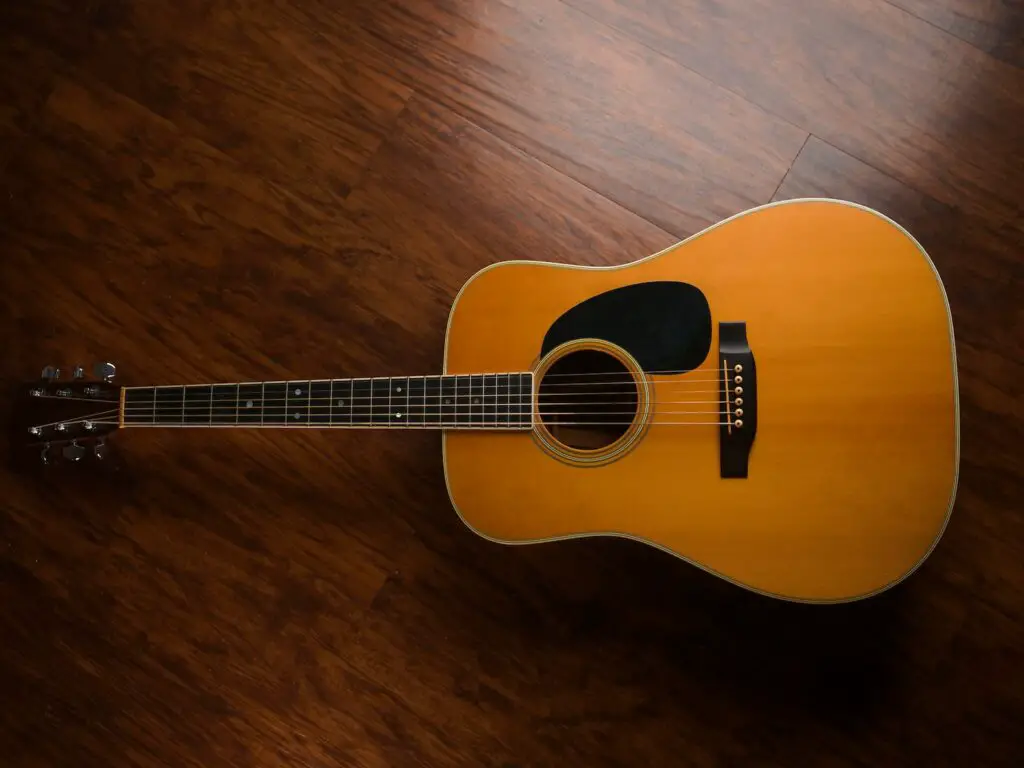Acoustic guitars are beloved for their warm, rich tones and the distinctive character they can add to a performance.
Many experienced players believe that an acoustic guitar’s sound improves with age due to changes in wood composition, instrument stability, and other factors.
Others are more sceptical, noting that many factors can impact a guitar’s tone, and age may not accurately predict quality.
To gain more insight into the fact that age makes a difference in sound production, it would be beneficial to examine both the science and art behind acoustic guitar sound.
Effect of Playing On the Sound Of Acoustic Guitars
Enthusiasts of acoustic guitars believe that these instruments sound better with age and not just because of the natural aging of wood.
The number of hours logged also plays a significant role in the aging process, with the contribution of human oils.
As a guitar is played repeatedly, areas of exposed wood, such as the neck and fretboard, absorb oils from dead skin, sweat, and even saliva, which can seal the wood and keep unwanted moisture and dirt out of the wood grain.
While excessive dirt can affect intonation and have negative consequences, the natural absorption of sweat and evaporation can have a positive effect.
Additionally, the impact of string vibration on guitars is believed to alter their tone over time, resulting in a more pleasing sound.
However, scientific studies have only shown subtle differences in frequency response, and ultimately, the subjective experience of a musician is what determines whether a guitar sounds better with age.
How Long Does It Take For An Acoustic Guitar To Age?
A guitar doesn’t need to be expensive to provide years of enjoyment to its player. The key is in the quality of materials and craftsmanship used during construction of an acoustic guitar.
Even an affordable acoustic guitar constructed with top-notch tonewoods and meticulous attention to detail can last for years, providing hours of joy.
As the guitar ages, its sound may evolve slightly as its tonewoods lose moisture, becoming lighter and more resonant.
This results in improved sustain and tone with a richer, warmer character.
Timing of this process varies based on several factors, including the guitar’s environment and level of use.
However, it usually takes years or even decades for the sound to develop.
No matter the price point or quality, proper care and maintenance are essential for any guitar, regardless of age or quality.
Does A Guitar Sound Better Over Time?
Tonewoods lose moisture as they age, which improves guitar sound quality. Their moisture content decreases as these woods dry out, making them lighter and more resonant.
The aging process of wood takes a gradual, progressive course and may take up to 40 years or more, depending on environmental conditions.
Furthermore, changes in its internal structure occur as part of this aging process.
This can influence the sound quality of a guitar, with improvements such as improved sustain, balanced tones and warmer tones.
The moisture content of tonewoods is integral in improving guitar sound quality as they age. This process causes changes to the internal structure of the wood, leading to better sustain, balance, and tone.
Aging can produce a rich, complex, well-rounded sound through these high-grade tonewoods.
Do Guitars Increase In Value With Age?
It is commonly believed that older guitars hold more value than newer models, there are exceptions depending on the model and make of the instrument.
To determine the true worth of a guitar, it’s wise to consult price guides and do extensive research on comparable models.
Furthermore, one may seek the opinion of an experienced guitar appraiser with expertise in valuation.
When valuing an instrument, individual should consider factors like condition, rarity, material quality and historical significance.
Some guitars may sound better than their modern equivalents, while some newer models surpass older ones in sound quality.
Why Is Acoustic Guitar So Difficult To Play?
Acoustic guitar playing can present more of a challenge for beginners regarding technique and theory.
Acoustic guitars with heavier strings require more finger strength and may be harder to press down, particularly for novice players.
Furthermore, the higher action of the strings requires players to exert more pressure to produce clear notes and chords, which may prove challenging for beginners.
Why Do Acoustic Guitars Sound Better Over Time?
Acoustic guitars have long been said to improve with age.
This phenomenon is caused by the breakdown of water-soluble sugars within wood’s cell walls, making the wood lighter and more resonant while retaining strength and flexibility.
As an acoustic guitar ages, its wood can dry out and change its tone and resonance.
This aging process of wood may produce a more complex and richer voice with greater sustain and projection.
Acoustic guitars are known for their subtle yet diverse range of tones, unlike electric guitars, which offer more dramatic shifts.
Age can certainly affect a guitar’s value; however, it’s not the only or most significant factor. Other variables such as model, condition, and rarity also play a significant role in determining its worth.
An acoustic guitar in excellent condition with an unusual design may be worth more than an older electric guitar in average condition.
Does The Age Of An Acoustic Guitar Affect Its Price?
No. The cost of a guitar depends on various factors like its brand, manufacturer and type. While some older guitars may fetch higher prices due to their rarity or historical significance, new guitars can be just as costly or even more so.
Ultimately, quality, craftsmanship and unique features determine an instrument’s final cost rather than its age.
What Are Some Drawbacks Of Playing An Acoustic Guitar?
Acoustic guitars can pose some challenges for beginners, as they often have wider fretboards and heavier strings, which can be difficult to handle.
Additionally, acoustic guitars tend to be more fragile than their electric counterparts, requiring more care and maintenance.
Do Acoustic Guitars Need High Maintenance?
Although guitars tend to be durable instruments, they still require proper care and maintenance.
To avoid costly repair issues, it is recommended that you purchase your acoustic guitar from a reliable dealer or musician.
Regular upkeep such as cleaning and string replacement also plays an important role in keeping the instrument in top condition and preventing costly repair in future.





